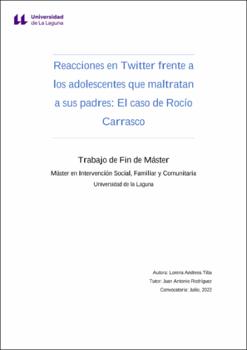Reacciones en Twitter frente a los adolescentes que maltratan a sus padres: El caso de Rocío Carrasco.
Autor
Tiba, Lorena AndreeaFecha
2022Resumen
La violencia filio parental no es solo un grave problema familiar sino también
social que merece ser abordado. Como ocurre en otros tipos de violencia, la percepción
social es relevante para la comprensión y la intervención de esta realidad. En ese sentido,
la presente investigación explora las reacciones de los usuarios de Twitter acerca de las
causas de la VFP y sus percepciones sociales. Concretamente, en la investigación se han
establecido los siguientes objetivos; identificar los discursos de las creencias sobre las
causas de la violencia filio parental, conocer las creencias sobre la maternidad y las
relaciones madre-hija que aparecen en los tweets y analizar las creencias sobre las
reacciones frente a la hija en los tweets.
Para obtener la información necesaria para la investigación, se ha analizado una
muestra de 154 tweets en contra de la madre a través del programa Atlas-ti(9). Los tweets
fueron analizados a través de un sistema de nueve dimensiones organizadas en 40
categorías, no obstante, en este estudio nos centraremos en cuatro dimensiones: creencias
sobre la maternidad, creencias sobre la relación madre-hija, creencias sobre las causas de
VFP y las reacciones frente a la hija.
Como resultados obtenidos se puede observar que cuando los tweets son en contra
de la madre, hay un incremento del apoyo hacía la hija. Los usuarios argumentan el origen
de la violencia filio parental a través de la parentalidad inadecuada y la adolescencia. Por
otro lado, se observa que califican a la víctima como “mala madre” por su desempeño y
calidad de madre. Este dato se relaciona con hecho de contar públicamente su testimonio,
ya que se considera que una buena madre no debe denunciar ni contar públicamente las
agresiones de sus hijos.
Palabras clave: violencia filio parental, mitificación de la maternidad,
parentalidad inadecuada, víctima, agresor Child-to-parent violence is not only a serious family problem but also a social one
that deserves to be addressed. As in other types of violence, social perception is relevant
for understanding and intervening in this reality. In this sense, this research explores the
reactions of Twitter users about the causes of VFP and their social perceptions.
Specifically, the research has established the following objectives; to identify the
discourses of beliefs about the causes of child-parent violence, to know the beliefs about
motherhood and mother-daughter relationships that appear in the tweets, and to analyse
the beliefs about the reactions to the daughter in the tweets.
To obtain the necessary information for the investigation, a sample of 154 tweets
against the mother was analysed through the Atlas-ti(9) program. The tweets were
analysed through a system of nine dimensions organized into 40 categories, however, in
this study we will focus on four dimensions: beliefs about motherhood, beliefs about the
mother-daughter relationship, beliefs about the causes of CPV and the reactions to
daughter
As results obtained, it can be observed that when the tweets are against the mother,
there is an increase in the support of the daughter. Users argue the origin of child-parent
violence through inadequate parenting and adolescence. On the other hand, it is observed
that they qualify the victim as a “bad mother” due to her performance and quality as a
mother. This data is related to the fact of telling her testimony publicly, since it is
considered that a good mother should not denounce or publicly tell the aggressions of her
children.
Keywords: child-parent violence, mythification of motherhood, inadequate parenting,
victim, aggressor violencia filio parental mitificación de la maternidad parentalidad inadecuada víctima agresor





